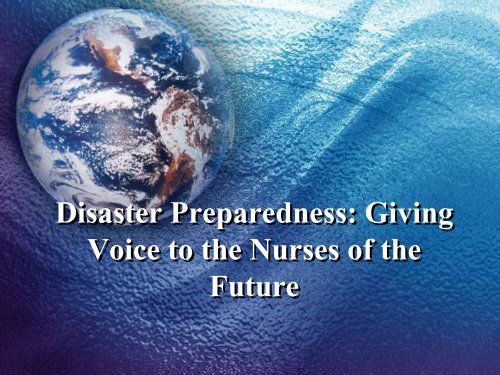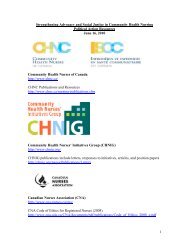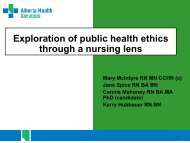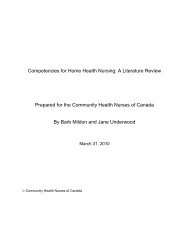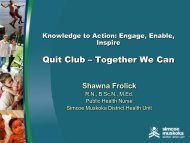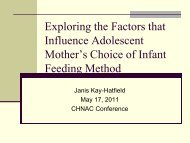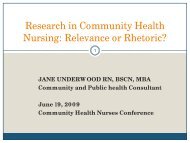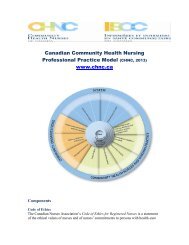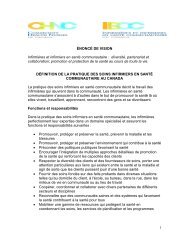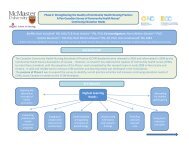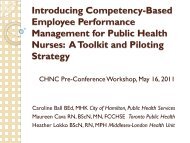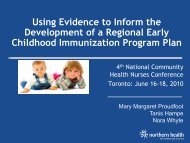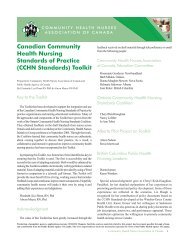Disaster preparedness - Community Health Nurses Canada
Disaster preparedness - Community Health Nurses Canada
Disaster preparedness - Community Health Nurses Canada
You also want an ePaper? Increase the reach of your titles
YUMPU automatically turns print PDFs into web optimized ePapers that Google loves.
<strong>Disaster</strong> Preparedness: Giving<br />
Voice to the <strong>Nurses</strong> of the<br />
Future
<strong>Disaster</strong> Preparedness: Giving Voice<br />
to the <strong>Nurses</strong> of the Future<br />
RYERSON, CENTENNIAL AND GEORGE<br />
BROWN COLLABORATIVE NURSING<br />
DEGREE PROGRAM<br />
Presented by:<br />
Corinne Hart<br />
Kathy Gates<br />
Judith Franks<br />
Catherine Walker<br />
2
Why disaster <strong>preparedness</strong>?<br />
• Recent World Events<br />
• The Role of Nursing Within the<br />
<strong>Community</strong><br />
• College of <strong>Nurses</strong> Standards and<br />
Guidelines<br />
“The College expects nurses to assume actively their<br />
obligation as self-regulating health care professionals<br />
by providing nursing care during an epidemic.”<br />
Fact Sheet, Practice Guideline, Preparing for an Influenza<br />
Pandemic; www.cno.org/pubs/pandemic.html retrieved, April 24,2008<br />
3
The Program: Merging the three<br />
dimensions<br />
IDEAS Program<br />
Classroom<br />
Field/Independent
The Program: IDEAS<br />
IDEAS: Interprofessional <strong>Disaster</strong>/Emergency Action<br />
Studies<br />
A collaborative project<br />
– Centennial College<br />
– The Michener Institute for Applied <strong>Health</strong><br />
Sciences<br />
– Ryerson University Collaborative School of<br />
Nursing<br />
– University of Toronto Faculty of Medicine<br />
– George Brown College<br />
5
The Program: Classroom & Field<br />
• Time Commitment<br />
• Placement Requirements<br />
• Relevance of material to curriculum<br />
• Selection of participants<br />
6
Conceptual Development<br />
• Setting the stage: defining disaster<br />
• Critical analysis<br />
• Beginning to understand roles<br />
• Communication processes<br />
7
Individual/Local planning<br />
• Creating home disaster plan: If<br />
quarantined; If evacuate; How prepared<br />
are you?<br />
• Local and Campus Planning: Guest<br />
speakers<br />
• Planning Principles: Integrating the<br />
Determinants of <strong>Health</strong>. What is a<br />
Communication plan?<br />
8
Critical exploration<br />
Critical analysis of a disaster:<br />
• Is it possible to plan?<br />
• What about vulnerable populations?<br />
• How was this demonstrated with<br />
Hurricane Katrina?<br />
• What is the role of nursing in disaster<br />
management?<br />
• What about the concepts of primary<br />
health care, social marketing,<br />
determinants of health?<br />
9
Multidisciplinary roles<br />
• Panel discussion – Ryerson safety officers<br />
• Toronto Fire Services: Platoon Chief<br />
guest speaker<br />
• Group interviews of people responsible for<br />
disaster <strong>preparedness</strong> and response<br />
• Relationships with students on-line and at<br />
live simulations/mock disasters<br />
10
Communication in disaster response<br />
• Communication skills<br />
“… a big thing we learned through the<br />
course was the importance of<br />
communication”<br />
Student comment – Post Program March 29, 2008<br />
• Newspaper article assignment led to<br />
critical analysis of media<br />
• Fire chief exemplified an excellent<br />
communicator and reinforced the essential<br />
nature of communication and decision<br />
making<br />
11
The role of the nurse<br />
• Guest from RNAO highlighted the nursing<br />
competencies and roles<br />
• <strong>Disaster</strong> <strong>preparedness</strong> in relation to the<br />
CNO Entry to Practice Competencies<br />
12
Ethical issues<br />
• Vulnerable populations<br />
• Decision making challenges<br />
• Role of the Nurse/role of the Student<br />
Nurse<br />
• Volunteers vs ‘recruited’<br />
13
• Academic literature<br />
Global Perspective<br />
• Critical exploration of a Global disaster<br />
• Model WHO: Viewing <strong>Health</strong> form a<br />
Political- Social-Economic Perspective:<br />
Post-conflict Processing of Child Soldiers<br />
14
Real life experiences<br />
• Two Mock disasters – organized by<br />
IDEAS Program<br />
• Interviews of key Toronto organizations<br />
who have <strong>Disaster</strong> Plans i.e. Police,<br />
Ambulance, TTC<br />
• Preparation of disaster plans for U of T<br />
residences<br />
15
Benefits of this program<br />
• Setting a foundation for new knowledge<br />
development in disaster <strong>preparedness</strong><br />
• Giving voice to nursing students in<br />
disaster management; interdisciplinary<br />
communication<br />
• Raising awareness of disaster<br />
<strong>preparedness</strong>: personal & professional<br />
• Provide student nurses with the skills set<br />
to become leaders in disaster planning<br />
16<br />
and management
Challenges<br />
• Teaching a Pilot Project: new<br />
relationships; new technologies<br />
• Interdisciplinary communication<br />
• Teaching from a theoretical framework<br />
without the personal experience<br />
• What skills do the students need?<br />
17
Serendipitous Learning<br />
• Voiceless ness of nurses – changed the<br />
focus of the course<br />
• Nurse have the role/skills base to provide<br />
a leadership role in disaster planning &<br />
management<br />
• There is a need to develop a critical mass<br />
of prepared nurses<br />
18
Lessons Learned<br />
• We need to position nurses to be leaders in<br />
disaster planning and management – the<br />
need to develop interdisciplinary<br />
awareness & communication skills<br />
• The student populations are engaged and<br />
ready to learn the necessary skills for<br />
disaster management<br />
• There is a need to empower our nursing<br />
students to have a louder ‘voice’<br />
• Curricular implications – where does this<br />
Program fit?<br />
19
Thank You<br />
• Questions?<br />
• Comments?<br />
20


